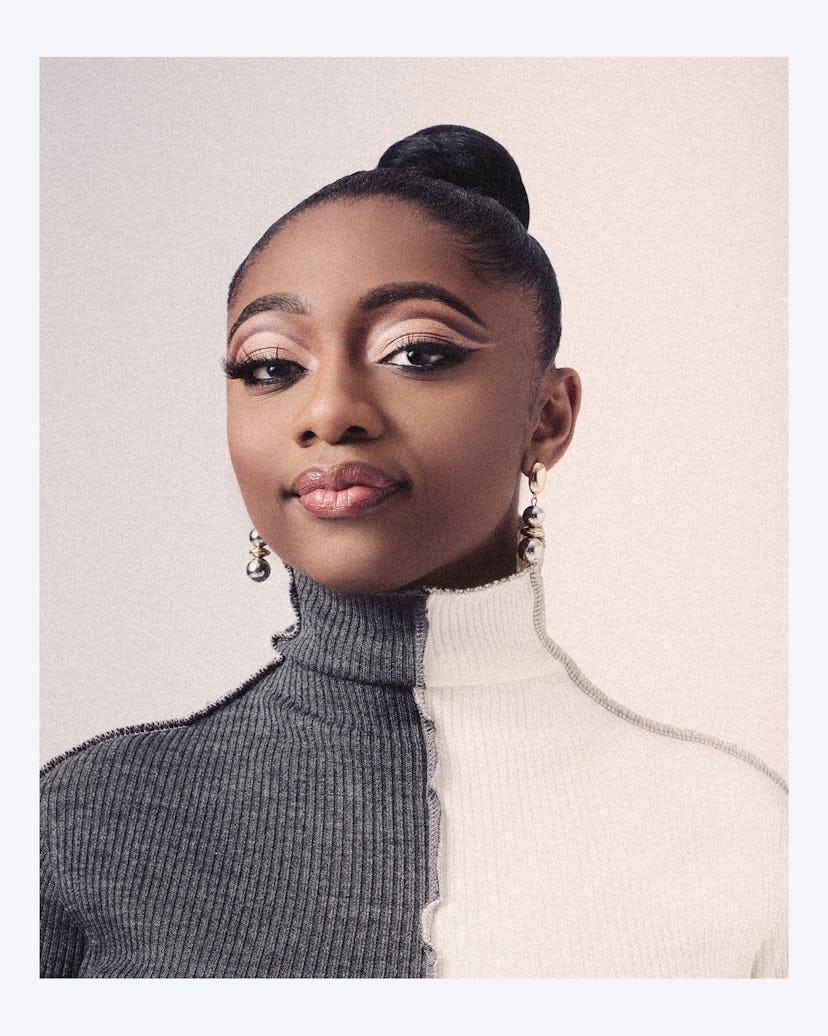Samara Joy was ready to make her mark on the jazz scene back in 2019, when she won the prestigious Sarah Vaughan International Jazz Vocal Competition. But just a few months later, COVID-19 took hold. While that kind of stall in trajectory might have thrown anyone else for a loop, Joy, 23, instead doubled down on honing her craft, pivoting her focus toward cementing her place among the jazz vocalist canon. She released an unplanned, eponymous debut for the U.K.-based indie label Whirlwind Recordings in 2021—and took full advantage of quarantine, posting intimate and stirring performances on her Instagram channel. “I’m a much more developed artist now than I was then,” Joy tells me over Zoom before a performance in Raleigh, N.C. “I’m in a much better place now than I was at that point.” Perhaps that’s because fate stepped in—and now, her ascension to stardom is inevitable.
Two years later, Joy is on a multicity tour and has already made appearances on The Late Show With Stephen Colbert, The Today Show, and The Kelly Clarkson Show. Last November, the Bronx native garnered her first Grammy nominations for Best New Artist and Best Jazz Vocal Album for Linger Awhile, her critically acclaimed sophomore effort and debut on the historic Verve Records label. This Sunday night, she’ll find out whether she’s going home with a golden gramophone.
When the nominations were first announced, Joy says she was on an Amtrak train returning to New York from D.C. “My family and the label team texted me around 12:30 p.m.: ‘You got nominated.’ I totally forgot,” the musician recalls with a laugh. “It’s not like I wasn’t watching it on purpose—I just wasn’t thinking about it.” Despite her nonstop touring, recording, and releasing Linger Awhile in the same year, Joy evokes a calm kind of composure, which she attributes to her close-knit family.
“Making sure that I’m always talking to [my family] keeps me grounded—FaceTiming with them all the time and keeping them in front of me. Because with everything that’s happening, it is easy to lose track of that,” she says. “The days keep going by, and my time with them—in person, at least—is lost.”
Her bond with her relatives is far more than just familial, as her lineage closely aligns with her chosen career path. Joy’s paternal grandparents, Elder Goldwire and Ruth McLendon, founded the Philadelphia gospel group The Savettes. And her father, Antonio McLendon, is a bassist and singer who toured with the late gospel singer Andraé Crouch, plus has worked with Gladys Knight, Patti LaBelle, and Donna Summer, among others (Joy’s last name is McLendon). She learned from her father that her grandmother started the mobile church ministry in Philadelphia. “They rented a van, and my grandparents, my dad, and his siblings would ride around, pick a corner, and just have church. My aunts and uncles would sing, and my grandmother or grandfather would preach.”
Surprisingly, Joy didn’t start out singing right away. “My mom said I was very quiet when I was young—I only [ever] talked or was loud when I cried,” she recalls. Being surrounded by music, however, Joy soon realized the church, music, it was all a part of her. She decided it was time to sing, and began participating in choirs during middle school and musical theater in high school. During that time, Joy became a worship leader at her church for the next two years, which she says was crucial to her development as an artist and musician.
“All of a sudden to be put in the position of [having] to lead a song and lead a set of music—it was new to me,” she says. “People were coming up to me, like, ‘You sound good, but don’t blink when you’re up there; we can tell [that] you’re nervous.’ I was forced to get out of my comfort zone. It’s like, ‘You accepted this opportunity, and now you have to work at it. You have to develop this confidence and get away from the shyness.’”
While taking home a Grammy at the upcoming 65th ceremony would undoubtedly be a feather in her cap, for Joy, accolades are not the endgame. “This will be a long journey that, hopefully, lasts for a while,” she says. “Thinking about all this stuff now is overwhelming. I’m not going to get a big head about it because I’m aware of all the things I want to improve. And I always want to be like that. I want to celebrate the wins, but also think about what I can do to move forward, elevate, get better, learn, and just be a better artist and a better person. I’m not necessarily reaching for one mountaintop moment.”
